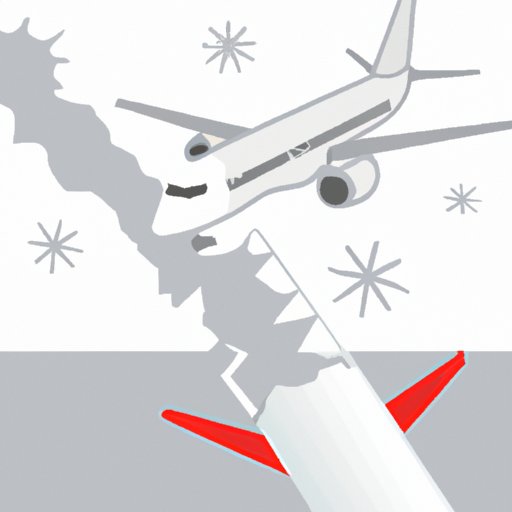Introduction
Since the onset of the COVID-19 pandemic, travel has been greatly affected. From cancelled flights and reduced capacity for cruise ships to quarantine requirements and heightened safety protocols, the world of travel looks much different than it did just a year ago. This article aims to explore how the pandemic has impacted the travel industry, from airlines to hotels, as well as the mental health implications of limited mobility. By the end of this article, readers should have a better understanding of how to safely navigate the new world of travel.

Impact on the Airline Industry
The airline industry has experienced some of the most significant changes due to the pandemic. According to data from the International Air Transport Association (IATA), global passenger traffic decreased by almost 70% in 2020 compared to 2019. In addition, airline ticket prices have dropped significantly, with some flights costing as little as $25. However, the availability of flights has also decreased due to the lack of demand. Airlines have had to reduce their flight schedules in order to remain afloat during the pandemic.
On top of that, many airlines have implemented new safety protocols in order to protect passengers and crew members. These protocols include wearing masks at all times, social distancing measures, and frequent disinfection of high-touch surfaces. Many airlines also require passengers to fill out health declarations prior to boarding. All of these measures have been put in place in order to minimize the risk of spreading the virus.

Changes to Airports and Security Protocols
Airports have also had to make adjustments in order to keep travelers safe. Social distancing measures are now in place throughout airports, including at check-in counters, security checkpoints, and boarding gates. Temperature checks and other health screenings are also being conducted before passengers are allowed to board their flights. In addition, airports have increased their sanitation measures, such as providing hand sanitizer stations and disinfecting high-traffic areas more frequently.
Effects on the Cruise Ship Industry
The cruise ship industry has also been hit hard by the pandemic. Most major cruise lines have had to cancel trips due to restrictions on international travel, resulting in refunds for passengers. In addition, cruise ships have had to reduce their capacity in order to comply with social distancing guidelines. As a result, there are fewer passengers on each ship, leading to lower profits for the industry.
Cruise lines have also implemented new safety protocols in order to protect passengers and crew members. These protocols include mandatory temperature checks, frequent disinfection of public areas, and contact tracing. Passengers are also required to wear masks at all times while onboard the ship. By following these protocols, cruise lines hope to minimize the risk of spreading the virus.
Impacts on Tourism
The pandemic has had a drastic effect on tourism around the world. With international borders closed and quarantine requirements in place, many travelers have opted to stay home. This has led to a significant decline in international tourism, with destinations like Italy, Spain, and France experiencing some of the steepest drops in tourist numbers.
In addition, many travelers have shifted their focus from traditional vacation destinations to local ones. With people unable or unwilling to travel abroad, they have turned to exploring their own backyards. This has resulted in a surge of domestic tourism, with many travelers opting to take “staycations” instead of going abroad.
The decline in international tourism has had a major impact on local businesses and economies. Hotels, restaurants, and shops that rely on tourists for income have been struggling since the start of the pandemic. This has resulted in job losses and economic hardship for many people around the world.
Adjustments for Hotel Accommodations
Hotels have had to make a number of changes in order to accommodate guests during the pandemic. Many hotels have turned to online booking services in order to reduce contact between guests and staff. Additionally, hotels have increased their cleaning and sanitation measures, such as providing hand sanitizer stations and disinfecting high-touch surfaces more frequently. Contactless check-in and payment options have also become more popular, allowing guests to check-in and pay without having to interact with anyone.
Restrictions on International Travel
International travel has been heavily restricted due to the pandemic. Many countries have closed their borders and imposed strict quarantine requirements on incoming travelers. Additionally, visa requirements have become stricter in some countries, making it more difficult for travelers to enter.
These restrictions have made international travel much more difficult, if not impossible, for many people. Those who do manage to travel internationally must comply with the rules and regulations of the country they are visiting in order to avoid any legal repercussions.

Mental Health Implications of Limited Mobility
The pandemic has also had a profound effect on our mental health. For many people, the inability to travel has been a huge source of anxiety and stress. The loss of freedom and independence, coupled with feelings of isolation, can lead to depression and other mental health issues.
It can be difficult to adjust to the new normal of limited mobility, but there are ways to cope. Taking time to relax, engaging in activities you enjoy, and connecting with friends and family online can all help to ease the stress of living in a pandemic.
Conclusion
The COVID-19 pandemic has drastically changed the way we travel. From changes to the airline and cruise ship industry to restrictions on international travel, the travel industry has been greatly impacted by the pandemic. Hotels, airports, and tourism have also had to make adjustments in order to accommodate travelers during this time. Additionally, the mental health implications of limited mobility cannot be ignored.
It is important to follow safety protocols when traveling during the pandemic. Wear a mask, practice social distancing, and wash your hands frequently. While traveling may look different now, it is still possible to explore the world with the proper precautions.
(Note: Is this article not meeting your expectations? Do you have knowledge or insights to share? Unlock new opportunities and expand your reach by joining our authors team. Click Registration to join us and share your expertise with our readers.)
